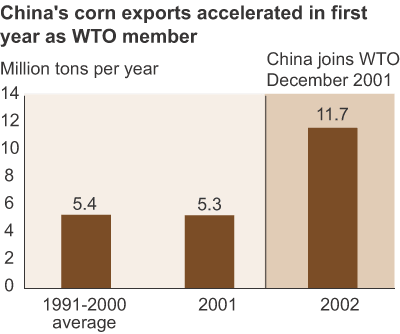China Slow in Meeting WTO Commitments
- by Fred Gale
- 4/1/2003
The impact of China's accession to the World Trade Organization (WTO) fell short of expectations in 2002. Its agricultural imports failed to increase despite tariff cuts, elimination of export subsidies, a reduced role of government-sponsored trading companies, and greater transparency in trade-related regulations. Its exports of many agricultural commodities increased, also contrary to expectations.
The corn market is the most prominent example of unrealized WTO effects. After joining the WTO, China's elimination of export subsidies for corn was expected to reduce its corn exports—among the world's largest in recent years. Instead, China's corn exports continued at near-record levels in 2002 (11.7 million tons) as China promoted exports to draw down large stockpiles of grain accumulated during the 1990s. Though China ended export subsidies for corn as part of its WTO commitments, those subsidies were reportedly replaced by internal transportation subsidies and tax rebates, and its exports in 2002 were still priced well below domestic prices.
China's corn imports were negligible in 2002, despite China's agreement to allow corn imports at a low 1-percent tariff. Potential importers (mostly Chinese feed mills) had to apply for permission to import, and there were several months of delays in processing applications. Most applicants were given permission to import only a small quantity of corn that would not fill a cargo ship. Imports were assessed a 13-percent value-added tax in addition to the 1-percent tariff, raising the cost of imports above the cost of Chinese corn.
China's trade performance in 2002 was not due entirely to its policy measures. Tight world supplies helped China's corn exports. Rising world market prices due to drought in North America reduced the need for subsidies, making Chinese exports more competitive and imports more costly for Chinese buyers. China's corn exports are likely to drop if world prices decline.
China's WTO accession negotiations were unusually lengthy and complex, as negotiators sought to close potential loopholes. Nevertheless, China's policymakers are still finding ways to align agricultural trade with domestic policy objectives. China's agricultural sector has become more market oriented and transparent in recent years, but tight government control over foreign trade still makes it difficult to predict global market impacts. In the long run, WTO accession will likely provide the competitive pressures needed to integrate China's agricultural sector with world markets, but it may be slow in coming.
This article is drawn from:
- China's Corn Exports: Business as Usual, Despite WTO Accession. (2002). USDA, Economic Research Service.


